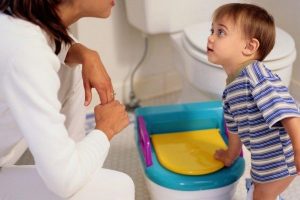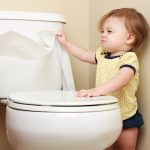 Potty training usually isn’t something parents look forward to, but most are eager to get the job done. No matter which potty training method you choose to follow, it’s important to gauge whether your little one is ready to start. Readiness can make the process more efficient and less stressful for everyone involved.
Potty training usually isn’t something parents look forward to, but most are eager to get the job done. No matter which potty training method you choose to follow, it’s important to gauge whether your little one is ready to start. Readiness can make the process more efficient and less stressful for everyone involved.
Highlights:
|
Here’s a compilation of expert advice about potty-training readiness. The American Academy of Pediatrics advises that while it isn’t necessary for your child to show all of these signs, the more they show the better their chances of potty training success.
- Age — While certain methods have more defined age recommendations, most experts advise starting potty training after age 18 months and finishing by age 24-36 months.
- Physiological Factors — If your child pees and poops regularly and predictably, he keeps a diaper dry for at least 2 hours during the day, and is dry after naps, these are all signs that his digestive system and bladder are mature enough that he can hold his pee or poop long enough to get to a potty chair or toilet.
- Cognitive Factors — In order to master potty training your child needs to be able to recognize the feeling of needing to pee or poop, connect it with the act of using the toilet, and remain focused long enough to complete the task.
- Language Factors —To learn the steps involved in using the toilet, your child should be able to understand and communicate potty-related vocabulary through words or gestures, as well as follow simple, sequential directions.
- Gross & Fine Motor Factors — Your child needs to be able to walk to the potty, manage his clothes with help, sit down, and stand back up again.
- Emotional Factors — Potty training tends to be easier when children show a desire to do things independently. It’s also an emotional milestone for your little one, as he is literally letting go of something he views as belonging to him (yup, we’re talking about his pee and poop). If he exhibits signs of distress when you introduce potty-related material (books, dolls, potty seats, etc.), you may want to hold off.
- Lifestyle Factors — Potty training is not only emotional for your child, it also requires time, energy, patience and enthusiasm. For those reasons, it’s a good idea to start when you and your child are both relaxed (no major life changes like a new job or move), your child is healthy (no illness or constipation), and your child is cooperative. That last point may make you chuckle; a cooperative toddler, who ever heard of such a thing? It just means that if your little one is going through an especially rebellious phase, it may not be an ideal time to start.
- Behavioral Factors — If your child shows he doesn’t like wet or dirty diapers by asking to be changed, it’s a good indication that he may be up for using the potty.
- Social Factors — Social imitation can be a powerful motivator. Your child may show curiosity when you, older siblings or others use the bathroom and imitate the actions. He may also see older children wearing underwear and show interest in wearing them himself.
Want to get a head start on preparing your child for potty training? Here are some things you can do long before the big day to set him up for success.








